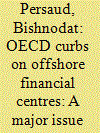| Srl | Item |
| 1 |
ID:
019229


|
|
|
|
|
| Publication |
April 2001.
|
| Description |
245-269
|
| Summary/Abstract |
Tanzania's 1995 presidential election was the first multi-party contest since independence. Polling was marred by irregularities and the complexities needed to recognize the interests of Zanzibaris and mainlanders. The twists and turns of the fortunes of the parties that fielded candidates in the elections are examined, the pre-eminence of personalities over issues considered, and the delicate democracy within the competing parties analysed. While international observers concluded that, despite various shortcomings, the overall outcome probably reflected the will of the people, concerns remained at the nature of democracy in Zanzibar.
|
|
|
|
|
|
|
|
|
|
|
|
|
|
|
|
| 2 |
ID:
019227


|
|
|
|
|
| Publication |
April 2001.
|
| Description |
199-211
|
| Summary/Abstract |
Of 35 countries identified as tax havens by the Organization for Economic Cooperation and Development, 26 are members of the Commonwealth. States which fail to revise policies identified as harmful by July 2001 will face concerted defensive action by OECD member states and other countries. Commonwealth Finance Ministers have sought to mitigate the effects of the policy on affected member states but it is not yet clear how successful its intervention has been. The OECD's policy of 'naming and shaming' of countries, many of them small and weak with limited economic opportunities, raises legal and ethical questions, and could destroy the rationale for offshore financial centres.
|
|
|
|
|
|
|
|
|
|
|
|
|
|
|
|
| 3 |
ID:
019228


|
|
|
|
|
| Publication |
April 2001.
|
| Description |
213-227
|
| Summary/Abstract |
Accountability of a country's police, military and intelligence agencies to ensure that they remain within their mandates is a critical element for democracy in Commonwealth countries. The author compares the effectiveness of monitoring systems across a spectrum of Commonwealth nations with variable records of democracy and human rights. Even where a strong mix of mechanisms to oversee the security forces exists, sections of the security forces can retain an officially sanctioned free rein over their activities with no guarantee of parliamentary accountability.
|
|
|
|
|
|
|
|
|
|
|
|
|
|
|
|
| 4 |
ID:
019226


|
|
|
|
|
| Publication |
April 2001.
|
| Description |
213-228
|
| Summary/Abstract |
Although most observers have focused on the domestic impacts of South Africa's transition to democracy, most notably the dismantlement of its apartheid political system, this process has also entailed the transformation of South African foreign policy. As former President Nelson Mandela aptly explained in Foreign Affairs several months prior to victory in the presidential and legislative elections of 1994, he considered the charting of a new foreign policy as a 'key element' in the creation of a 'peaceful and prosperous' South Africa. The primary purpose of this article is to offer an assessment of the foreign policy adaptation strategies adopted by the Mandela and Mbeki administrations in their quest to further strengthen South Africa's ongoing transformation from an isolated international pariah to leader of the African renaissance. An initial section outlines five strategies designed to adapt South African foreign policy to the new realities of the post-apartheid era: restoring civilian control over the security apparatus; restructuring the foreign policy establishment; self promotion as the leader of the 'African renaissance'; adherence to the foreign policy principle of 'universality'; and assuming a leadership rôle in international organizations. Section two explores how the process of democratization has favoured the reemergence and strengthening of the rôles played by a wide variety of state and non-state actors within the foreign policymaking process. A final section sets out five issues that will continue to set the tone of debates over South African foreign policy well into the first decade of the new millennium. An important conclusion of the article is that although the case study of South Africa in many respects constitutes a microcosm of the foreign policy challenges confronting other African countries, it also offers insights into the foreign policy adaptation strategies pursued by emerging powers in other regions of the world.
|
|
|
|
|
|
|
|
|
|
|
|
|
|
|
|